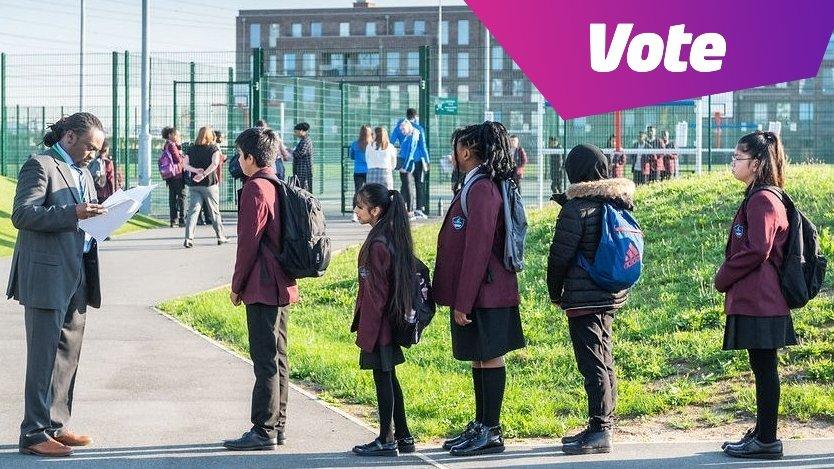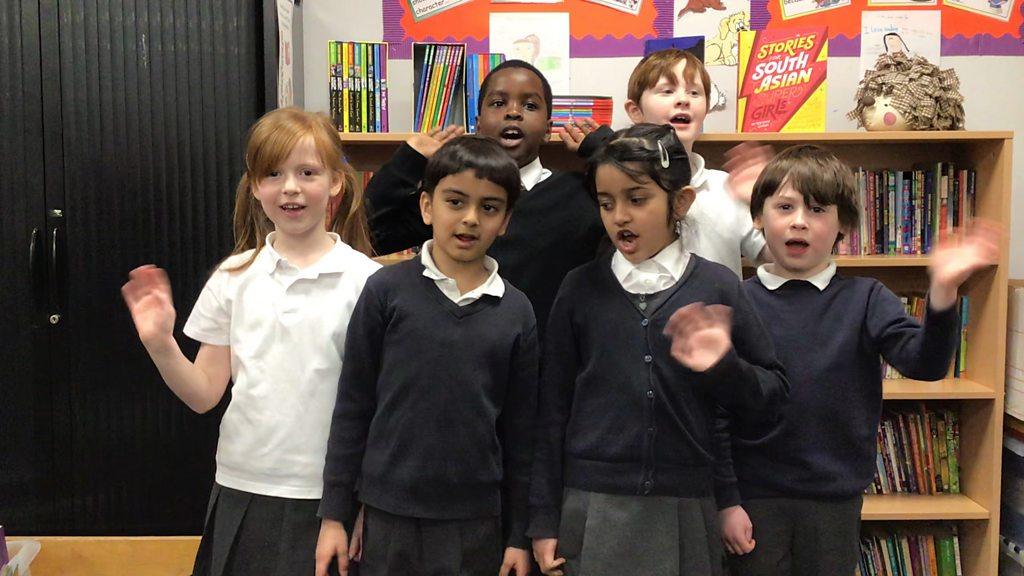Back to school: Campaign for more support for deaf pupils
- Published
- comments
WATCH: Toby, Dinah and Austin want clear masks in all schools (subtitles available)
Deaf students have been telling Newsround they're worried about the impact face masks in schools will have on them.
The government announced a change to the rules in England as part of its 'road map' for relaxing lockdown rules.
While face coverings already had to be worn in communal areas such as corridors, staff and students in secondary schools are now being advised to wear them in all areas, including classrooms, where social distancing isn't possible.
The government says it's a "temporary measure until Easter" which will be kept under review.
Its guidance says: "Teachers should continue to be sensitive to the additional needs of their students, such as deafness, in deciding whether it is appropriate to wear a face covering."
But young people, and the charity, the National Deaf Children's Society (NDCS), have raised concerns about the impact masks will have on children with hearing loss and their education.
Why are face coverings a problem for deaf children?
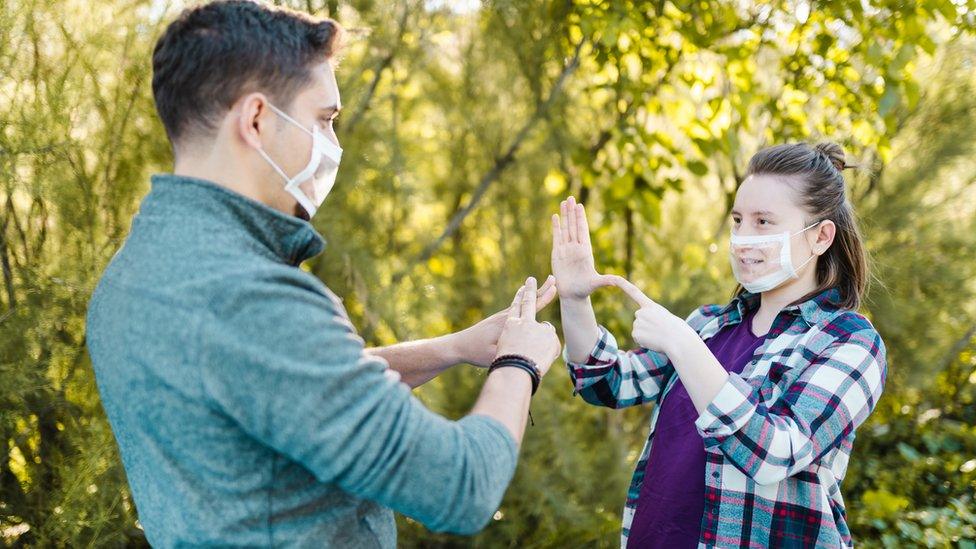
Clear masks mean deaf people can see someone's mouth to help them lip read
Face masks and coverings have become a big part of everyday life and they're an important way of helping to keep people safe during the pandemic.
But they can be a real challenge for someone who is deaf. Most deaf children lip-read, and it's impossible to see someone's mouth under a mask unless it is made from a clear material. Masks also cover up someone's facial expressions - another key way of reading and understanding what someone is saying.
If teachers and pupils need to wear a face covering in the classroom, the NDCS has warned that it will have a "devastating effect" on deaf children's ability to take part in lessons.
It's not the first time issues have been raised around the impact face coverings can have on deaf children.
If you're deaf and heading back to school, talk to your teacher about what you need. If this is difficult, find an adult to help, like your parents or your Teacher of the Deaf or Teaching Assistant if you have one.
Becky Forrow, from the charity, said: "It's important that everyone can keep safe at school, but we need to remember that bringing face masks into classrooms will have serious consequences for deaf children and young people.
"Almost all of them rely on lip-reading to communicate and face masks are going to make this impossible. It'll be much harder for them to understand their teacher, get involved in classroom discussions or chat to their friends."
'Face masks will make it more difficult for me to learn in lessons'
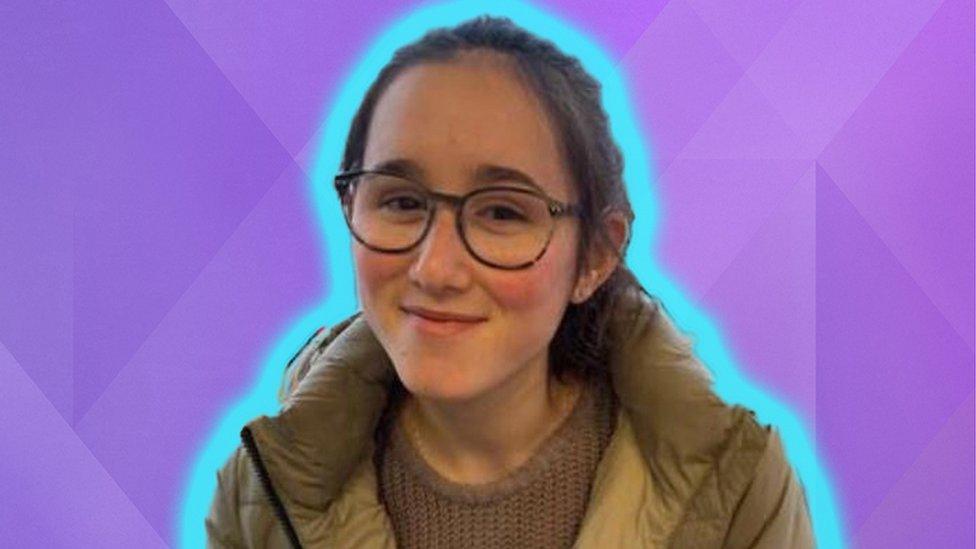
Dinah has started a petition asking for more support for deaf students returning to school
Dinah, 17, is the only student in her year at school with hearing loss. She said she wasn't looking forward to being back at school.
It's why she started a petition - which has been signed by more than 40,000 people - asking the government to do more to support deaf pupils.
She told Newsround she felt "anxious, worried and sad" when she heard about the plans for coverings in schools: "It'll make it much more difficult for me to join in conversations, so I'm worried I'll feel isolated."
35,000 students with hearing loss are relying on your decisions to help us have a fair and equal future.
She's asking the government to "do everything possible" to make sure that young people with hearing loss can still understand their teachers.
She suggests they make it clear to schools and colleges that "all necessary adjustments must be made, whether these are transparent face coverings, face shields or visors, note-takers or sign language interpreters, additional hearing technology, and so on".
WATCH: Last year Austin called on the government to introduce clear masks across the UK
Last year 11-year-old Austin wrote to the prime minister, with the backing of his local MP, asking for clear masks and visors to be introduced more widely across the UK.
When he heard about face coverings being worn in classrooms, Austin told Newsround he felt "scared and worried" because it would mean he, and other deaf children, might not be able to lip read.
He's been handing out leaflets in his local area with tips on them about the impact masks can have on deaf people, as well as giving out clear visors to schools and taxi companies which transport deaf children to and from school.
He's backing calls for clear masks to be used in schools across the UK.
Austin's mum says he is "lucky" that his school has staff who are qualified and can use sign language when they communicate with him.
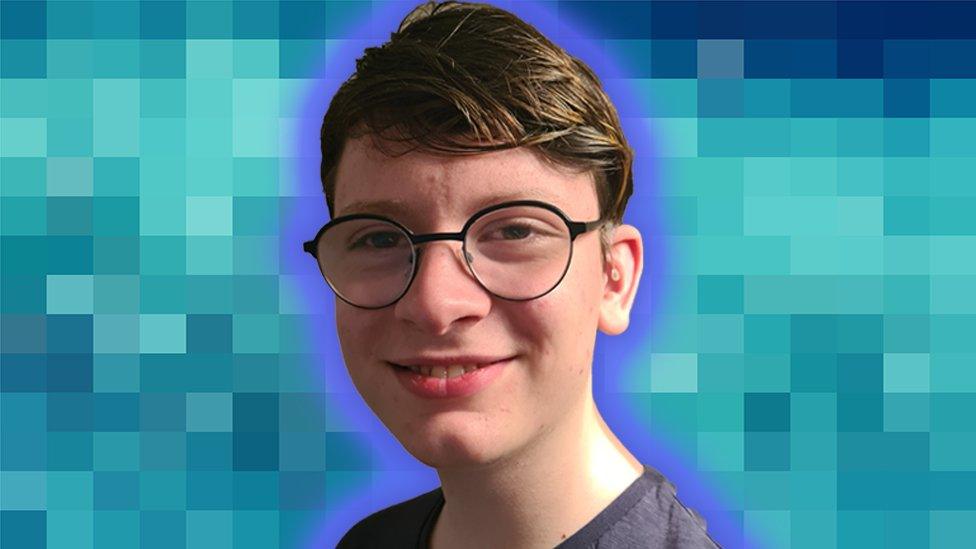
Toby, 15, said: "Face masks have always been a struggle for me, but now in school if teachers are wearing them I won't be able to lip read them or understand parts of the lesson - which is essential to me."
Returning to school is a big barrier for me as I've got friends who will also be wearing face masks. When they're communicating with a face mask on, I will feel left out as I cannot lip read them clearly.
He says he wants decision-makers to "think more about deaf people, as education should always be equal".
"To have a law that implements clear shields and face masks would be brilliant for me and other deaf people as it reduces the barriers on learning, especially with the barriers that we've already had to overcome," he added.
What has the government said?
WATCH: Hayley asks Vicky Ford, the government minister responsible for children, about the new school mask rules and what's being done to support deaf pupils (subtitles available)
The government guidance says the recommendation around masks for Year 7 students upwards in classrooms, and during activities where it's not possible to social distance, is a temporary measure and informed by the "best available scientific and public health advice".
Its guidance says "transparent face coverings, which may assist communication with someone who relies on lip reading, clear sound or facial expression to communicate, can also be worn", but it does not advise clear visors are used.
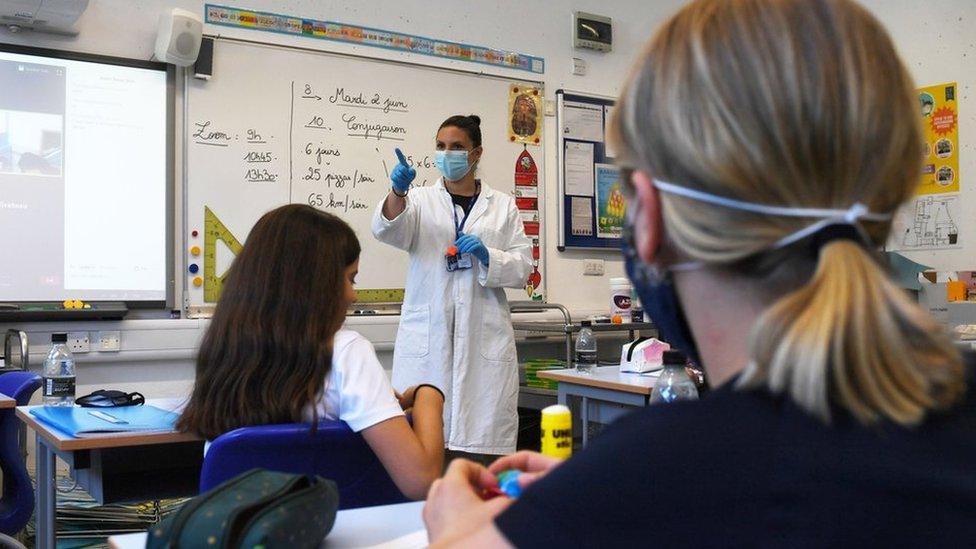
Teachers and students in secondary schools in England are advised to wear face masks if they can't social distance
A Department for Education spokesperson told Newsround:
"We know face coverings can make it more difficult for children with additional needs to communicate, who might rely on lip reading or facial expressions for understanding.
"Some children and staff don't have to wear face coverings in school, including anyone who relies on lip reading or facial expressions to communicate. Schools should make adjustments for children with additional needs, so they can learn and be taught alongside their peers so we have given schools detailed guidance on this."
We have committed to reviewing face coverings by Easter, and in line with all decision-making throughout the pandemic, will follow the best available scientific and public health advice at the time.
The government also told Newsround that it's working with "tuition partners to strengthen their digital and online offering and capabilities, for example, adapting online content to better meet the needs of students with special educational needs (SEN)".
Advice and support
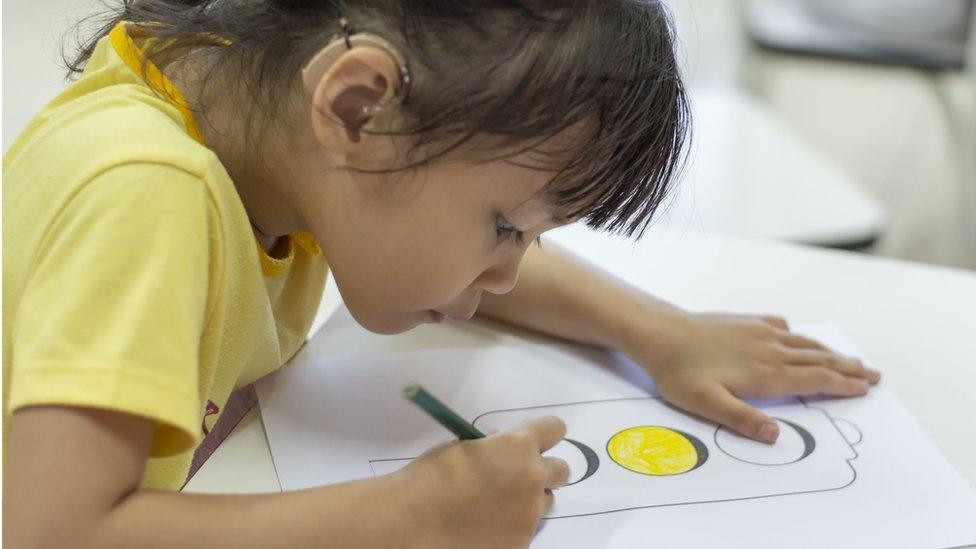
If you're deaf and worried about returning to, or being back at school, there is support and help.
Talk to an adult you trust about how you're feeling, this could be a parent or teacher. If you have a Teacher of the Deaf or Teaching Assistant speak to them about how they can help you feel included and understand what they're saying.
Don't feel you need to go through it alone. People will want to help you get the best out of school.
The NDCS also recommends letting your friends know how they can help and support you too.
Becky Forrow, from the charity, added: "If you have a friend who's deaf, set aside some time to chat in a way that works for them, whether that's using speech, gestures, texting or writing things down. Above all, let them know that you're there for them and they don't have to do everything on their own."
It's also important to be patient with them and make sure you check in on them to see if they're ok.
Do primary school pupils in England have to wear masks?
The rules make it clear that primary school children do not need to wear face coverings.
The government does recommend that staff and adult visitors in schools wear one if they can't follow social distancing rules though, for example in corridors and communal areas.
Older children and young people with special educational needs or disabilities may not have to wear a face mask depending on their needs.
What are the rules around masks and pupils elsewhere in the UK?
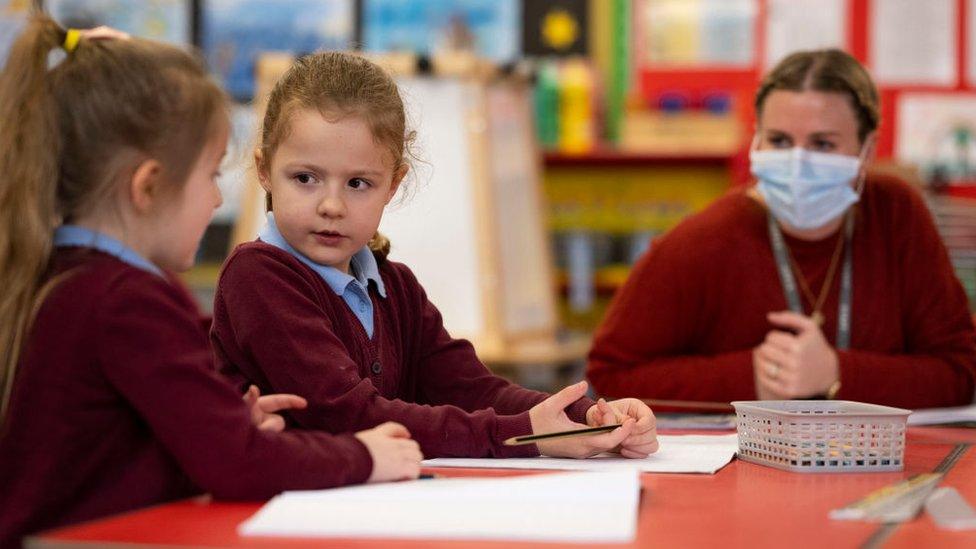
In Wales staff at primary and secondary schools should wear masks if they can't follow social distancing rules
There are different rules around masks and schools depending on where you live, but across the UK people don't have to wear masks if they can't, for example because of a physical or mental impairment, or disability.
The NDCS charity estimates there are around 35,000 children with hearing loss in schools across the UK.
In Northern Ireland, it is compulsory for older students (post primary) to wear face coverings in school. Guidance there also says: "Staff and pupils, other than those in Post Primary, may wish to use face coverings during the routine school day and this is acceptable."
In Scotland, in areas in Levels 3 and 4 older secondary school pupils (S4 to S6) should wear face coverings in the classroom, as well as when they are moving around the school and in communal areas.
In Wales, where social distancing rules can't be followed in schools, face coverings should be worn, including in the classroom, by staff at primary and secondary schools as well as secondary-school learners.
- Published5 January 2021
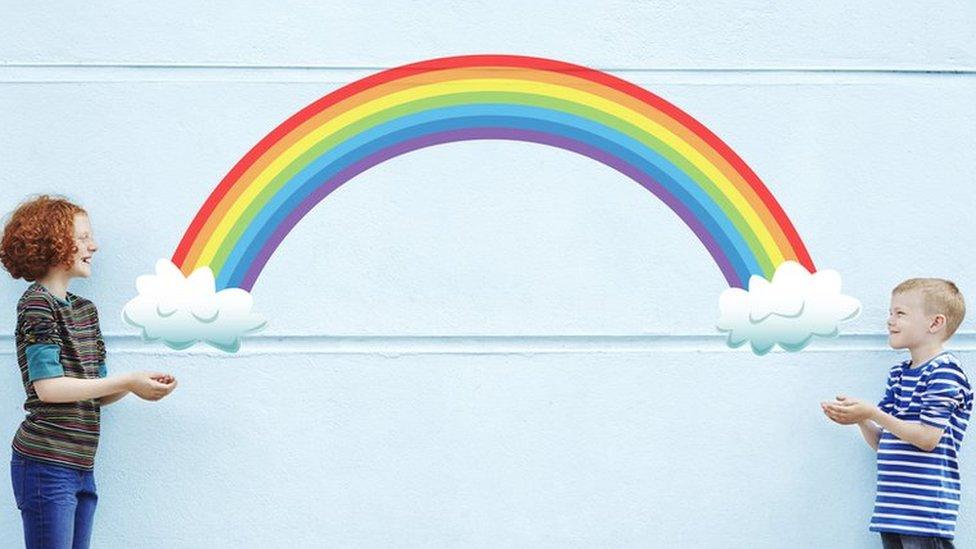
- Published8 March 2021
